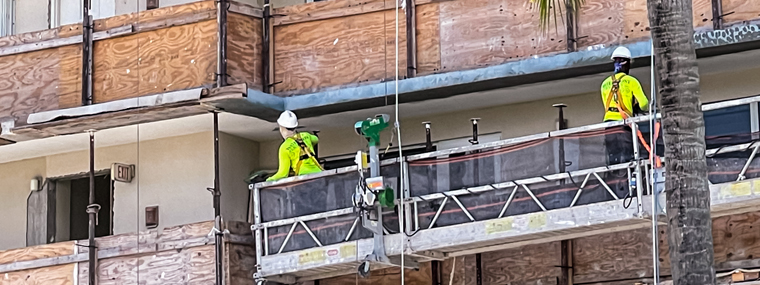
Structural Integrity Reserve Studies Q & A
By Matt Kuisle P.E., RS, PRA / Published January 2024

Because structural integrity reserve studies (SIRS) are new to the industry, there remains some uncertainty around the new requirements. Following is a list of questions many property managers and boards are frequently asking and things we have learned so far.
Does our current reserve study fulfill the requirements of a structural integrity reserve study?
A reserve study (non-SIRS) may not fulfill the statutory requirements. While Reserve Advisors takes into consideration each of the building components that apply to the structural integrity reserve study, your existing study does not include language specific to the new legislation nor does it include a funding plan specific to the structural integrity components.
What happens if we don’t comply with conducting our structural integrity reserve study by the December 31, 2024, deadline?
Unless you are coordinating directly with your milestone inspection in 2025 or 2026, the failure of a board to obtain a SIRS, if required for the association, now is specifically deemed to be a “breach of the officers’ and directors’ fiduciary relationship to the unit owners” under Florida Statute 718.111(1)(a).
The SIRS is not required to be provided to the “local enforcement agency” or the unit owners under the terms of either SB 4-D or SB154. It does become a part of the official records, and any owner who is offering his or her unit for sale is required to provide a copy of the SIRS to the prospective purchaser. In addition to this requirement, the statutes now have specific disclosures at the time of unit sales pertaining to these studies. If a community has not done their SIRS as required, the statutes call for the following:
“Each contract entered into after December 31, 2024, for the sale of a residential unit shall contain in conspicuous type a statement indicating that the association is required to have a milestone inspection, a turnover inspection report, or a structural integrity reserve study and has not completed such inspection, report, or study, as appropriate.”
If a community has done the SIRS, the statutes call for disclosures in conspicuous type on each contract entered into after December 31, 2024, for the resale of a residential unit. The disclosures are specifically outlined in the statute and require the buyer to acknowledge that they have received the SIRS, and any contract that does not conform is voidable at the option of the purchaser prior to closing.
Buyers and their lenders are going to be looking for these disclosures in sales contracts. Omitting them or including the disclosure that they have not complied with the law will likely have a negative impact on sales in a community. It’s not clear how an insurance underwriter would look at noncompliance, but it is safe to assume it could make obtaining directors’ and officers’ insurance more difficult.
What if we can’t meet the funding recommendations outlined in our structural integrity reserve study?
Any budget adopted on or after December 31, 2024, requires that a SIRS be used as the basis for funding structural reserves. Funding recommendations outlined in a study are the direct result of near-term project needs and the existing reserve balance. While the law specifically states that the association must attain the annual funding level outlined in the structural integrity reserve study, there may be cases where it is difficult if not impossible to do so without the use of additional assessments. We encourage you to meet with your provider to review their recommendations and any alternate options that may be available, which may or may not alleviate the ability to attain appropriate funding levels. For example, funding of nonstructural reserve items can be waived with the prior approval of a majority of the owners. In the event your association is still unable to meet its funding obligations, we encourage you to consult with legal counsel to better understand the risk associated with being noncompliant.
Can we still have pooled reserves?
Yes, the bills allow for the use of the pooling method to maintain reserves. If a community is currently pooling reserves, we recommend splitting the reserves into two pools because any funds set aside for structural items can never be used on nonstructural items (i.e., elevators or air conditioning). The actual separation of existing funds may still require a vote of the owners, but this likely depends on the defined purpose of the existing funds and may require a legal opinion.
How much should we put into each pool?
Generally, the criteria for reallocation into two funds will essentially be the distribution of replacement costs and remaining useful lives between the two funds. Reserve Advisors has developed a proprietary algorithm to determine the ideal split of existing pooled funds based on the association-maintained components’ specific circumstances (costs and remaining useful lives). We believe this will identify the most optimal, advantageous split of existing resources to ensure the funds are in the right place at the right time.
Should we wait to conduct a SIRS to see what happens with future legislation?
Because structural integrity reserve studies are new to the market, it may be difficult to secure a contract for one at this time. We anticipate that demand for these studies will exceed the available supply in the marketplace, so we recommend you maintain communications with firms that either conduct or will be conducting these studies to stay informed of your options. As the law is currently written, the SIRS must be completed by the end of 2024. Lawmakers have indicated they do not anticipate extending this deadline. With high demand and limited providers, many firms are likely to run out of available capacity for new engagements several months before the end of the year.
Do we really have to fund full replacement of load-bearing walls, electrical systems, and other “long-lived” elements?
SB 154 clarified that reserves do not need to be funded for items with a remaining useful life of 25 years or more. For many newer buildings, several structural components may fall into that category. However, your reserve study provider may recommend repairs or partial replacements of those items prior to the need for full replacement.
Your SIRS should serve as a long-term planning and proactive asset management tool. While there is likely some reluctance and fear surrounding the increases in necessary funding (and resulting monthly or quarterly dues), your SIRS will set your community on course for success. Your board and membership will learn when further expertise or inspection is warranted and have a clear understating of the property’s true cost of ownership. Any increases in dues are investments in the physical and financial health of your community and will ultimately protect owners’ investments in their homes and ensure safe structures.
Matt Kuisle, P.E., RS, PRA
Regional Executive Director, Reserve Advisors
Matt Kuisle, P.E., RS, PRA, is the regional executive director for Reserve Advisors, leading the firm’s operations in Florida, Georgia, and the Carolinas. Matt has been conducting reserve studies for 23 years and is a frequent speaker and author. He is a licensed continuing education provider for FL CAMs and serves on the Community Associations Institute National Business Partner Council and as a council member with the Florida Legislative Alliance. Reserve Advisors is a leading provider of reserve study consulting services, having conducted reserve studies for more than 3,000 Florida communities.




